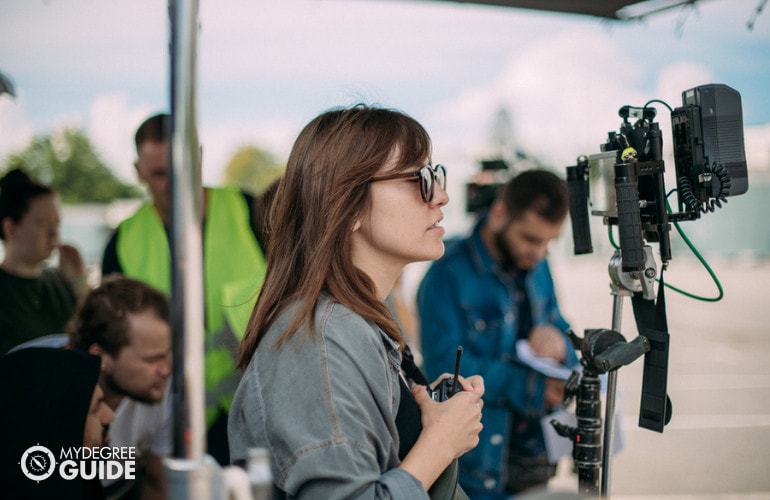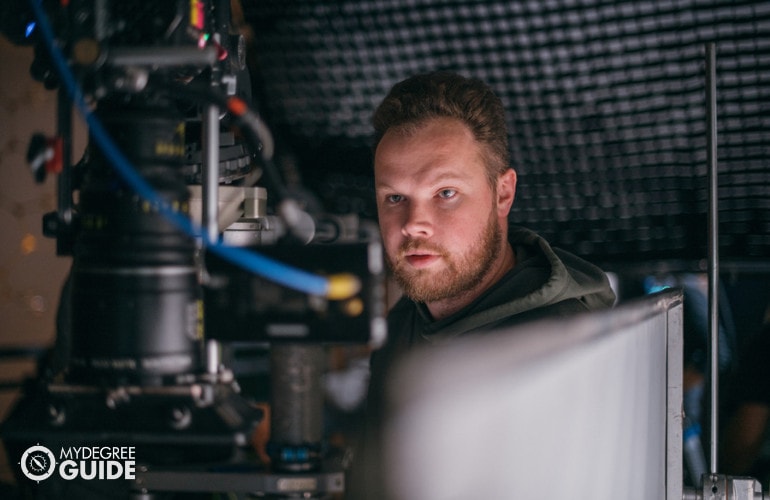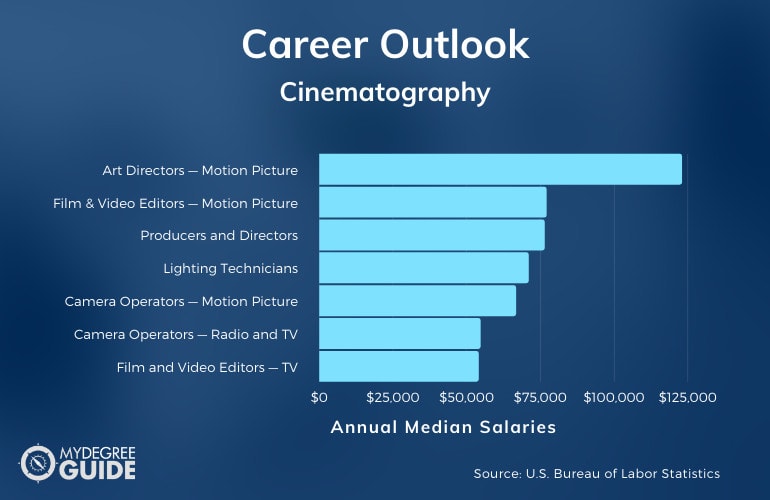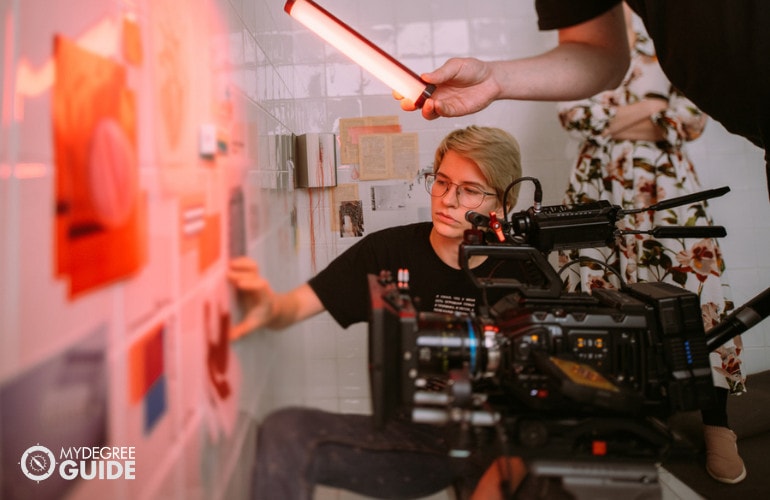An online cinematography degree can help you build the educational foundation for a career in cinematography.

You can get a hands-on and comprehensive understanding of filmmaking and digital cinematography production. Online programming can also help you structure your schooling around your professional and personal obligations.
Editorial Listing ShortCode:
Through a cinematography program, you may have the chance to network and to develop a powerful understanding of film history and theory.
Universities Offering Online Bachelors in Cinematography Degree Programs
Methodology: The following school list is in alphabetical order. To be included, a college or university must be regionally accredited and offer degree programs online or in a hybrid format.
Academy of Art University
The Academy of Art University offers a Bachelor of Fine Arts in Motion Picture Television with courses dedicated to Cinematography. Students must complete 132 credit hours and an internship to graduate. Classes are 7.5 to 15 weeks long. Applicants may apply online with official transcripts.
Academy of Art University is accredited by the WASC Senior College and University Commission.
Arizona State University
Arizona State University offers an online program for a Bachelor of Arts in Film and Media Studies. Students must complete 120 credit hours to graduate. Each of the 39 classes is 7.5 weeks long. Applicants must have a cumulative GPA of 3.0 or higher and submit ACT or SAT test scores to be eligible for the program.
ASU is accredited by the Higher Learning Commission.
Grand Canyon University
Grand Canyon University offers a Bachelor of Arts in Digital Film with an emphasis in Production. Students must complete 120 credit hours to graduate. Each class in the program is 7 weeks long. To be eligible for the program, applicants must submit an admissions form with their official transcripts.
Grand Canyon University is accredited by the Higher Learning Commission.
Indiana University
Indiana University offers an online program for a Bachelor of Science in Digital Media and Storytelling. Students must complete 120 credit hours to graduate. Students may choose to add a specialization in Public Relations or Digital Storytelling. Applicants must submit an online application with their official transcripts.
Indiana University is accredited by The Higher Learning Commission.
Maharishi International University
Maharishi International University offers a Bachelor of Arts in Cinematic Arts and New Media. Students in the program have opportunities to complete internships and portfolios as they finish the 48 credit hours required to graduate. Applicants must have a GPA of 2.5 or higher to be eligible for the program.
MIU is accredited by the Higher Learning Commission.
Miami International University of Art and Design
Miami International University of Art and Design offers an online program for a Bachelor of Fine Arts in Digital Filmmaking and Video Production. Students must complete 180 quarter credits to graduate. To be eligible for the program, applicants must submit high school transcripts or proof of high school equivalency certification.
Miami International University of Art and Design is accredited by the Southern Association of Colleges and Schools Commission on Colleges.
University of Arizona
The University of Arizona offers an online Bachelor of General Studies program with a focus in Arts, Media, and Entertainment. Students must complete 120 credit hours to graduate. Those interested in the program must submit an online application with official transcripts from all the schools they’ve attended.
The University of Arizona is accredited by the Higher Learning Commission.
University of Massachusetts – Amherst
The University of Massachusetts—Amherst offers an online program for a Bachelor of Arts in Film and Media Studies. Students are able to transfer in up to 105 qualifying credit hours from past education, portfolios, or credit exams. Those interested in the program must have at least 12 credit hours to transfer into the program and a GPA of 2.0 or higher.
The University of Massachusetts Amherst is accredited by the New England Commission of Higher Education.
University of Montana
The University of Montana offers an online Bachelor’s in Media Arts program. To graduate, students must complete 121 credit hours. To be eligible for the program, applicants must submit copies of their official high school transcripts and have either a minimum GPA of 2.5 or be in the upper half of their graduating class.
The University of Montana is accredited by the Northwest Commission on Colleges and Universities.
Wilmington University
Wilmington University offers a Bachelor of Science in Video and Motion Graphics with a concentration in Digital Film-Making. To graduate, students must complete 129 credit hours. Students are given the opportunity to complete internships during the program. Applicants must submit official transcripts to the school when applying.
Wilmington University is accredited by the Middle States Commission on Higher Education.
Online Cinematography Degrees

A cinematographer is responsible for capturing the emotions of the screenplay and its characters on film. From start to finish, a cinematographer’s key role is to bring the filmmaker’s vision to life. An online cinematography degree allows you to study every visual element in film and learn how to capture and produce the same impactful results.
There are technical aspects to this degree as well. You may be immersed in understanding graphic design, animation, lighting, camera lenses, filters, focus, exposure, and shooting techniques.Some of the course topics you may encounter while enrolled in cinematography school include:
- Scene composition
- Digital film lighting
- Visual storytelling
- Editing
- Screenwriting
Pursuing degrees in cinematography can help you enter into the very broad industry of entertainment. Roles in the cinematography aspect of the industry include:
- Film and video editor
- Camera operator
- Audio and video technician
- Lighting technician
If you’re artistic and want to tell stories through visual media, film cinematography school might be an avenue to pursue.
Cinematography Careers and Salaries

An online cinematography career can lead to a variety of careers in the media, communication, and entertainment industries.
According to the Bureau of Labor Statistics, the median salary for media and communication equipment workers is $50,870.
| Careers | Annual Median Salaries |
| Art Directors — Motion Picture and Video Industries | $122,960 |
| Film and Video Editors — Motion Picture and Video Industries | $77,040 |
| Producers and Directors | $76,400 |
| Lighting Technicians and Media and Communication Equipment Workers | $70,980 |
| Camera Operators — Motion Picture and Video Industries | $66,700 |
| Camera Operators — Radio and Television Broadcasting | $54,660 |
| Film and Video Editors — Television Broadcasting | $54,030 |
| Camera Operators — Government | $52,550 |
| Audio and Video Technicians | $47,920 |
| Camera Operators — Professional, Scientific, and Technical Services | $43,930 |
The Bureau of Labor Statistics states that employment in media and communication occupations is projected to grow 14% over the next ten years, which is much faster than average.
Jobs for film and video editors are expected to grow 33% over the same time period, and camera operators are expected to see 24% job growth (Bureau of Labor Statistics).
Cinematography Bachelor’s Curriculum & Courses

The courses you’re likely to take in an online cinematography program can include a range of theoretical courses, hands-on studies, and technical concepts. Here are examples of some you may encounter:
- Acting for Filmmakers: This course allows you to better understand actors’ perspective and their needs as you direct them in your leadership role.
- Digital Film Lighting: Lighting is complex and can be altered through artificial means, the physical environment, or post-production editing.
- Directing: This leadership role requires a specific kind of compassion and ethical approach, and you can learn the foundations to successful directing in this course.
- Editing: Editing is quite possibly the most important stage in all levels of filmmaking, including editing the script, the characters, and the film post-production.
- Screenwriting: Screenwriting is an essential aspect of cinematography. It includes worldbuilding, starting from the ground up.
- Professional Writing: You can learn how to write with a professional tone and how to communicate both orally and through written script. This skill is also applicable to networking within the industry.
- Special Effects: Special effects is an important aspect of filmmaking. You can learn about various editing programs and platforms as well as what effects can be implemented during filmmaking.
- Documentary Production: A documentary is a very specific kind of filmmaking that requires differentiated lighting, sounds, editing, and compassion.
- Digital Audio Production: This course can develop your understanding of using sound during filming as well as in the editing stage, such as the addition of music or sound effects.
- Location Scouting: Knowing what location fits the story is an essential part of cinematography. You can learn how to scout, how to propose contracts to private owners or to cities you wish to film in, and how to maintain the safety of crew members while on location.
Some programs may also require you to complete an internship or a final project.
How to Choose an Online Degree in Cinematography Program

Here are a few factors you may want to keep in mind when choosing an online degree in cinematography:
- Program topics. Does the program include specializations you wish to focus on? Is the program well-rounded for open-ended employment after graduating?
- Technology. Technology is quickly evolving, and so is its use in the industry. Enrolling in a program that’s on top of the latest technological trends can help you become more knowledgeable and competitive for the job market.
- Your finances and time. Does this program offer financial aid opportunities? Can the course scheduling be altered to suit your needs?
- School accreditation. It’s beneficial to ensure that your degree comes from a reputable program and school. The National Association of Schools of Art and Design recognizes programs in this field, and regional accreditation is a mark of quality schools.
You may want to research a number of programs in order to discover which ones are the right fit for you.
Admissions Requirements

While every program is different, here are a few admission requirements you may encounter as you pursue a bachelor’s in cinematography:
- ACT or SAT scores (only some schools require them)
- Official high school transcripts or GED equivalent
- Minimum GPA of 2.5 or higher, on average
- Letter of recommendation
It may help to include any relevant experience or cinematography projects in your application packet as well.
Accreditation

The status of regional accreditation marks schools as reputable. Not only is accreditation a stipulation for receiving federal aid, but it also signifies that your degree will be recognized nationwide. Accreditation can also play a part in determining the transferability of your college credits.
The National Association of Schools of Art and Design awards accreditation to high quality programs related to the arts, such as cinematography. You can also check the US Department of Education’s database of accredited schools to make sure that any programs you’re considering adhere to high-quality educational standards.
Financial Aid and Scholarships

You might be wondering what financial aid opportunities exist for you. Qualifying students may have the chance to receive grants, loans, scholarships, and state and federal aid.
If you enter into an entertainment-focused study, there could also be financial aid opportunities available to you from within the entertainment industry. For instance, organizations such as the New York Film Association, the Los Angeles Film School, or the Alliance for Women in Media offer scholarships to help students cover part of their schooling.
When you are beginning your financial aid journey, it can be helpful to start with filling out the Free Application for Federal Student Aid (FAFSA).
What Do Cinematographers Do?

Cinematographers work closely with other members of a film production. They ensure that they understand the creative vision of the film director, and they may also work with the lighting crew, camera operators, and production designer.
Depending on the size of a project, a cinematographer may also act as the director of photography, managing the camera and lighting crews. At the end of the day, a cinematographer is responsible for each shot of the film. This can include planning what type of camera equipment, composition, and lighting is needed for each moment of a scene.
What Can You Do with a Bachelor’s Degree in Cinematography?

The Bureau of Labor Statistics projects that employment for camera operators is expected to grow 24% over the next ten years. A bachelors in cinematography can help you become a more competitive candidate in this in-demand field.
Since work experience is especially important in the filmmaking sector, many graduates start off as assistants to more experienced cinematographers. Some may have the chance to start out as cinematographers for lower budget projects. Other careers related to the world of cinematography include film and video editors, camera operators, lighting technicians, and audio and video technicians.
How Long Does It Take to Get a Degree in Cinematography Online?
A bachelor’s degree in cinematography an help prepare you for entry-level positions in media, communications, and entertainment. If you were to enroll in a bachelors program that followed a traditional, 16 week semester, it would generally take 4 years to complete with full-time study.
Many online programs follow academic calendars with 8 week terms. If you follow this schedule full-time and take classes year-round, including during the summer, then you may be able to finish in less time. On the other hand, if you wish to create a part-time schedule for yourself, it will likely take longer to complete your program.
What’s the Difference Between Videography vs. Cinematography?
There is some overlap in skills between a videographer and a cinematographer, but here are a few key differences between the two roles.
| Videographer | Cinematographer |
|
|
A cinematographer generally requires more professional education than a videographer.
What’s the Difference Between Cinematography vs. Filmmaking Degree?
While filmmaking and cinematography are sometimes used interchangeably, there are some key differences between the two degrees.
| Filmmaker | Cinematographer |
|
|
Professionals who have extensive experience as cinematographers may try their hand at filmmaking.
Is a Cinematography Online Degree Worth It?

Yes, a cinematography online degree is worth it for many professionals. A cinematography program can help you develop in-demand skills for this expanding field.
The Bureau of Labor Statistics projects 24% job growth for camera operators and 33% job growth for film and video editors over the next ten years. Employment for audio and video technicians is expected to grow 26%, and 16% job growth is predicted for lighting technicians and media and communication workers (Bureau of Labor Statistics).
Getting Your Bachelor in Cinematography Degree Online

A bachelor in cinematography can help you turn your creative passion into an in-demand skill set. Pursuing an online film degree program allows you to follow your passions and professional goals at a pace that is more accessible for you, in whatever location is most convenient for you.
If you want to be a part of this dynamic and growing industry, you can begin by researching accredited universities that offer online bachelors degrees in cinematography. The sooner you start exploring cinematography programs, the sooner you can find the one that best aligns with your learning needs and professional goals.
